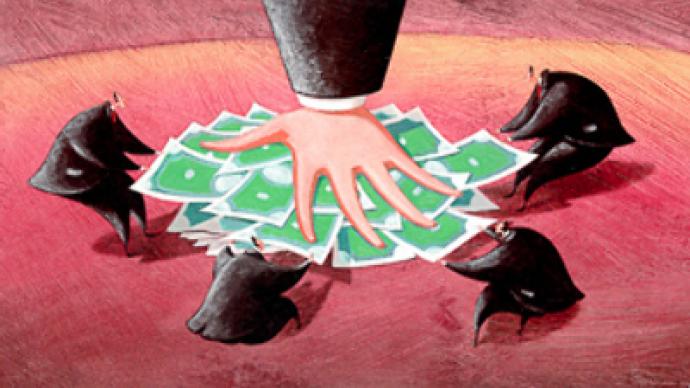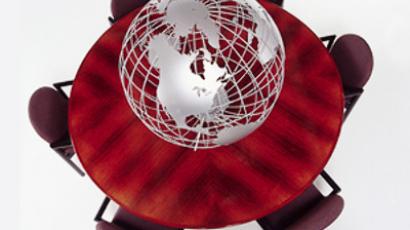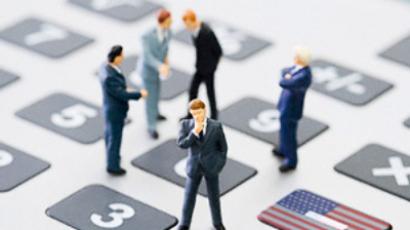The Great Bank Robbery: How the Federal Reserve is destroying America

As global leaders struggle to rescue their nations from economic breakdown, the legitimacy of the dollar as the world’s reserve currency is under attack. Perhaps the problem lies with the Fed.
A large part of the “super” in the American superpower is based on the modern creed of liberal democracy, which serves as the motor of free-market capitalism. And the lubricant that keeps this colossal machine humming at full speed 24/7 is the US dollar. So before we risk any conjectures on the future prospects of America’s versatile banknote, which presently serves as the ‘world’s reserve currency,’ perhaps we should know more about who controls it.
In the Fed We Trust
It usually comes as a shock to people – especially diehard Americans who place infinite trust in their sacred Constitution – when they discover that the US dollar is not a product of the American government. That’s right, fellow consumers, that crumpled wad of dollars in your pocket is the product of the U.S. Federal Reserve, and despite the very official title, is about as “federal” as Federal Express. The reality is that the U.S. Federal Reserve is a profit-making venture just like Wal-Mart, General Motors or McDonald’s.
Yet the US Constitution clearly states (Article 1, Section 8) that one of the many functions of government is to “coin money, regulate the value thereof.” Indeed, this task was deemed so important that the Founding Fathers mentioned it ahead of the obligation to “raise and support armies.” The Constitution says absolutely nothing about outside parties being responsible for printing money or regulating interest rates.
To quote Abraham Lincoln, the 16th president of the United States, “The privilege of creating and issuing money is… the supreme prerogative of government.”
Today, a handful of blue-blooded American politicians (a very rare breed these days, it seems) are beginning to echo ol’ Abe on the very same issue.
Ron Paul, the congressman from Texas who made an unsuccessful bid for the 2008 Republican Party presidential nomination, represents a growing number of Americans who want to see the Fed severely tamed, or put out of business altogether.
“Congress created the Fed although it had no constitutional authority to do so,” Paul told his peers during a recent House investigative meeting. “We forget that those powers not explicitly granted to Congress by the Constitution are inherently denied to the Congress and thus the authority to establish a central bank was never given.
“Congress… has essentially given up its oversight responsibilities over the Fed: there are no true audits; Congress knows nothing of the conversations, the plans, and the action-taking in concert with other central banks. We get less and less information regarding the money supply each year,” Paul continued.
Incidentally, but certainly not insignificantly, Paul, despite his huge grassroots popularity, was deliberately snubbed by the American media on numerous occasions, including during a primetime debate on Fox News.
“Despite his $20 million and 10% showing in new Hampshire polls, Fox News excluded Paul from its Sunday night republican debate,” wrote Andrew Malcolm in his Los Angeles blog. “So Paul gets 10% in Iowa and gets excluded, but Rudy (Giuliani) gets 4% and sits on the left end of the Fox Box desk. Hmmm.” (To see why CNN probably won’t be hosting another ‘College Week’ political program in the near future, click here ).
How does the US media justify the outright snub of a proven politician (Paul has served 10 consecutive terms in the House of Representatives)? The answer is simple: Ron Paul is one of the few men who poses a threat to the powers that be: The U.S. Federal Reserve System.
Top of the Pyramid
It is no secret that the power to print money and set interest rates constitutes the greatest power of any government.
“Let me issue and control a nation’s money,” commented international banker Amschel Rothschild, “and I care not who makes the laws.”
Henry Kissinger reduced the almighty powers of the Federal Reserve to one line: “Who controls money controls the world.”
Former chairman of the Federal Reserve Alan Greenspan, who served for 18+ years in his position, was asked by political talk show host Jim Lehrer: “What should be the proper relationship between a chairman of the Fed and the president of the United States?”
“Well, first of all, the Federal Reserve is an independent agency, and that means basically that there is no other agency of government (including the executive office) which can overrule actions that we take,” Greenspan responded matter-of-factly. “So long as that is in place… then, what the relationships are don’t frankly matter.”
In light of the above statements, it is safe to say that it is not US Commander-in-Chief Barack Obama who holds the reigns of real power in America, but rather Ben Bernanke, the chairman of the Fed.
Indeed, last December’s Newsweek magazine proudly announced that Bernanke was the “fourth most powerful person in the world,” behind Barack Obama, Hu Jintao and Nicolas Sarkozy, but ahead of Gordon Brown, Angela Merkel and Vladimir Putin (fourth, fifth and sixth place in the Newsweek power list went to central bankers, Bernanke, Jean-Claude Trichet (EU) and Masaaki Shirakawa (Japan), as opposed to national leaders)!
But there is another infallible maxim that also dictates our political life. “Power corrupts,” said Lord Acton, “but absolute power corrupts absolutely.”
So guess who is in the hot chair today for (possibly) corrupting his absolute power? Yes, that’s right, Mr. Ben Bernanke, who appeared last week before the House Oversight and Reform committee to explain some irregularities in his office.
At issue was the question of the Central Bank’s involvement in Bank of America’s controversial acquisition of Merrill Lynch.
Shortly after the US housing markets tanked, Bank of America moved to acquire Merrill Lynch. However, once it became known (at least in financial circles) that the investment bank was suffering major losses, Bank of America CEO Kenneth Lewis balked on the merger. What happened next is the center of the congressional investigation.
US lawmakers, armed with email correspondences taken from the Central Bank, argue that Bernanke overstepped his already-awesome authority by working behind the scenes to ensure that Lewis went ahead with the shotgun wedding.
In one email, it appears that Bernanke threatened that the Federal Reserve would replace Bank of America’s management if Lewis decided to pull out of his planned acquisition of Merrill Lynch, or seek government aid to clinch the deal. Forcing bank mergers through outright coercion was never intended to be the function of the Fed. Bernanke, of course, denies any wrongdoing.
“I believe that the Federal Reserve acted with the highest integrity throughout its discussions with Bank of America regarding that company’s acquisition of Merrill Lynch,” Bernanke told the committee members, while reclaiming the moral high ground by arguing that the Fed’s actions “averted a major financial crisis.”
Nevertheless, US lawmakers are swirling around Bernanke and the Fed like sharks that sense blood.
Congressman Dennis Kucinich, D-OH, criticized Bernanke for failing to provide information about Merrill Lynch’s huge losses in November so that shareholders could vote on the transaction.
“If the Fed knew that there were losses before the government deal took place, why didn’t it provide information to the SEC (Securities and Exchange Committee) so that shareholders were informed?” Kucinich asked.
Bank of America closed the deal with Merrill Lynch on Jan. 1 after the US government agreed to a $138 billion aid package to help bank of America complete the acquisition. The closed-door deal cost American taxpayers a cool $20 billion dollars. Meanwhile, the House investigation into the Fed actions will continue for weeks.
US Department of Usury
Besides having lost the power to regulate its own currency, the United States must also pay interest on the dollars it borrows. Given that the current bailout (and buy-in) of the American economy is in the ballpark of 9 trillion dollars it will take incalculable generations to pay back this monstrous bill.
“Henry Ford thinks its stupid and so do I, that for the loan of its own money the United States should be compelled to pay… interest,” complained the famous American inventor, Thomas A. Edison. “Why must we pay interest to money-brokers for the use of our own money!”
Given the trillions of dollars that the Federal Reserve has pumped into the economy to jumpstart consumer spending (indeed, Capitalism itself), many generations of Americans will be struggling financially as the United States goes from creditor nation to debtor nation practically overnight. Yet somehow US President Barack Obama still promises to create a long overdue national healthcare plan.
Much of the present financial stress began just after 9/11, some economists argue, when George W. Bush beseeched the American people to show defiance in the face of al Qaeda. Their recourse to action: ascend on the shopping malls in their Fords and Chevrolets en masse and shop! So the Federal Reserve, caught up in the euphoria, happily slashed interest rates and the banks, in cooperation with Wall Street, began to underwrite dangerously risky loans and subprime mortgages. Exactly how dangerous was revealed last year with the collapse of the US housing markets. The globe is still feeling the aftershocks, and some are predicting the arrival of yet another ‘big one’ before it’s all over.
For any American to see the US Constitution being arrogantly ignored to disastrous effect is enough to make a man want to activate other parts of the US Constitution – like form a standing militia and buy a rifle – and drive these pesky bankers straight out of town. To see how serious some Americans feel about the Fed and their shadow leaders, click here.
A less drastic course of action would be to limit the powers of the Federal Reserve, but rather incredibly Chairman Bernanke is requesting the strengthening of the Fed.
The Chairman of the Senate Banking Committee, Christopher Dodd, said the request to expand the powers of the Federal Reserve’s powers as being like giving your son a “bigger, faster car right after he crashed the family station wagon.”
But things seem to be heading in the opposite direction. As the Associated Press reported: “Obama wants to empower the Federal Reserve to oversee the largest and most influential financial firms.”
It seems absolutely ludicrous that Congress would want entrust more powers to the Federal Reserve, an “independent agency” that is not answerable to Congress.
“There’s not a lot of confidence in the Fed at this point,” Dodd commented after Obama’s speech.
End of the World’s Reserve Currency?
Since the start of the ongoing economic crisis, which caused a tremendous loss of confidence in the US dollar, there have been calls to rebuild the world’s financial architecture.
“We must rethink the financial system from scratch, as at Bretton Woods,” said French President Nicolas Sarkozy in September.
In July 1944, with World War II drawing to a close, 730 representatives from over 40 nations assembled at the Mount Washington Hotel in Bretton Woods, New Hampshire, US. Here, the delegates agreed on financial legislation – including the creation of the International Monetary Fund and World Bank – that would dictate economic policy in the West for the next half a century.
At the center of the agreement was the decision to make the US dollar the ‘world’s reserve currency,’ which was based on the gold standard. This system collapsed on August 15, 1971 when US President Richard Nixon “closed the gold window.” In other words, the dollar is no longer backed up by gold reserves, and to this day the US currency enjoys “dollar hegemony.” But for how long is another question.
In October, Prime Minister Vladimir Putin rattled financial markets when he hinted to his Chinese counterpart, Wen Jiabao, that the two countries “stop using US dollars in Russian-Chinese settlements.”
RT reported that Putin has also called for a complete overhaul of the world’s financial system to “end monopoly in world finance.”
China owns around $700 billion dollars of US debt in the form of Treasury Bonds, so it is understandable that the Chinese authorities are seriously considering what the heck to do with their investment at this point.
A US delegation that met with central bankers in China early this month provided some insight.
“It’s clear that China would like to diversify from its dollar investments,” said Republican Mark Kirk said at the Center for Strategic and International Studies, a Washington think tank.
Kirk said the Chinese leaders were critical in private of the US Federal Reserve’s policy of “quantitative easing” – which is in essence a flooding of the financial markets with cash. China views this as a reckless policy of printing cash out of thin air.
US officials estimate a deficit of $1.841 trillion for the 2009 budget.
Whatever US officials finally decide to do with the Federal Reserve, they may wish to reflect upon the British economist John Maynard Keynes’ suggestion for a world reserve currency.
Keynes suggested a ‘world currency unit,’ the bancor , which would regulate the international medium of exchange between nations. The famous supply-side economist envisioned the bancor being fixed upon the value of 30 commodities, with gold among them.
Now there's an idea worth banking on.














